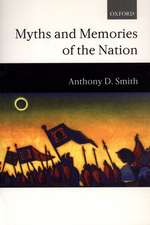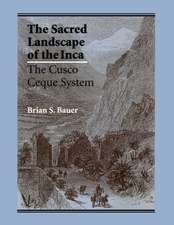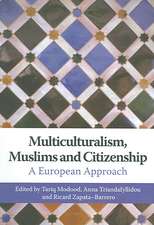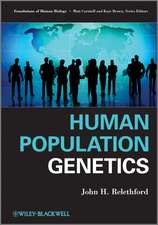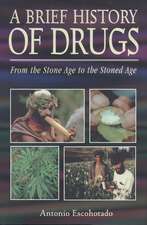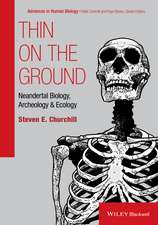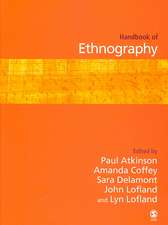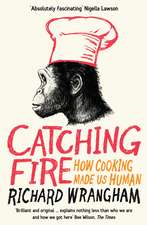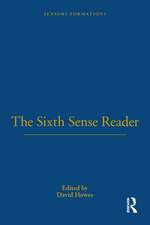Beyond the Classroom Walls: Ethnographic Inquiry as Pedagogy
Autor June A. Gordonen Limba Engleză Hardback – 20 sep 2002
| Toate formatele și edițiile | Preț | Express |
|---|---|---|
| Paperback (1) | 165.56 lei 6-8 săpt. | |
| Taylor & Francis – 13 sep 2002 | 165.56 lei 6-8 săpt. | |
| Hardback (1) | 370.32 lei 6-8 săpt. | |
| Taylor & Francis – 20 sep 2002 | 370.32 lei 6-8 săpt. |
Preț: 370.32 lei
Nou
Puncte Express: 555
Preț estimativ în valută:
70.86€ • 74.38$ • 58.82£
70.86€ • 74.38$ • 58.82£
Carte tipărită la comandă
Livrare economică 10-24 aprilie
Preluare comenzi: 021 569.72.76
Specificații
ISBN-13: 9780415934930
ISBN-10: 0415934931
Pagini: 164
Dimensiuni: 152 x 229 x 17 mm
Greutate: 0.47 kg
Ediția:New.
Editura: Taylor & Francis
Colecția Routledge
Locul publicării:Oxford, United Kingdom
ISBN-10: 0415934931
Pagini: 164
Dimensiuni: 152 x 229 x 17 mm
Greutate: 0.47 kg
Ediția:New.
Editura: Taylor & Francis
Colecția Routledge
Locul publicării:Oxford, United Kingdom
Recenzii
"The theoretical underpinnings of June Gordon's contribution to pedagogy have been around for a long time but have penetrated practice very little. Her unique contribution is in fusing theory and practice and illustrating that fusion in a range of contexts. It is a pleasure to have a silent conversation with an author who has command of both her material and the language of communicating it." -- John I. Goodlad, president of the Institute for Educational Inquiry in Seattle and professor emeritus at the University of Washington.
"Working again off the beaten track, June Gordon shows how ethnographic methods are effective not only for research but also for pedagogy on class and race issues. Reviewing insightful examples of ethnography for educational purposes, Gordon offers keen guidelines on doing transformative research, generating dialogues between researcher and researched, reconnecting students with communities, and informing students early about the hard realities of the teaching worlds. Researching, learning, and teaching are closely linked in Gordon's innovative approach." -- Joe R. Feagin, University of Florida (Author of Racist America, Routledge, 2000)
"The theoretical underpinnings of June Gordon's contribution to pedagogy have been around for a long time but have penetrated practice very little. Her unique contribution is in fusing theory and practice and illustrating that fusion in a range of contexts. It is a pleasure to have a silent conversation with an author who has command of both her material and the language of communicating it." -- John I. Goodlad, president of the Institute for Educational Inquiry
"Gordon's approach to teacher education is illuminating and rich...She includes her own transformation as a participant in the communities in which she teaches and lives as part of the larger story. We in teacher education would do well to model our work on hers." -- Anthropology & Education Quarterly
"Working again off the beaten track, June Gordon shows how ethnographic methods are effective not only for research but also for pedagogy on class and race issues. Reviewing insightful examples of ethnography for educational purposes, Gordon offers keen guidelines on doing transformative research, generating dialogues between researcher and researched, reconnecting students with communities, and informing students early about the hard realities of the teaching worlds. Researching, learning, and teaching are closely linked in Gordon's innovative approach." -- Joe R. Feagin, University of Florida (Author of Racist America, Routledge, 2000)
"The theoretical underpinnings of June Gordon's contribution to pedagogy have been around for a long time but have penetrated practice very little. Her unique contribution is in fusing theory and practice and illustrating that fusion in a range of contexts. It is a pleasure to have a silent conversation with an author who has command of both her material and the language of communicating it." -- John I. Goodlad, president of the Institute for Educational Inquiry
"Gordon's approach to teacher education is illuminating and rich...She includes her own transformation as a participant in the communities in which she teaches and lives as part of the larger story. We in teacher education would do well to model our work on hers." -- Anthropology & Education Quarterly
Notă biografică
June A. Gordon is Assistant Professor of Education at the University of California, Santa Cruz. She is the author of The Color of Teaching (RoutledgeFalmer, 2000)
Cuprins
Introduction 1. Students Reengaging Their Home Communities 2. Immigrants and Education: Dialogic Inquiry as Pedagogy 3. Future Teachers Assist in Urban, Low-Income, Multicultural Classrooms 4. Masks of Normality: Teacher Training on a Military Base 5. Confronting the Larger Community of Helping Professionals 6. Home Visits 7. Deconstructing Youth at Risk 8. Adult Educators Inquire into Workplace Stress 9. First Quarter Attrition: Community College Staff and Faculty Ask Why Afterword




